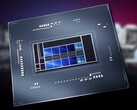Intel is expected to officially launch the Alder Lake lineup sometime in Q4 2021. Alder Lake will be based on a 10 nm Enhanced SuperFin process, now known as Intel 7. With the launch imminent, we are starting to see performance leaks of Alder Lake processors on several benchmarking sites. The latest is the Geekbench 5 entry of the flagship Core i9-12900K processor.
Intel traditionally held the single-core performance crown while AMD excelled in multi-core. With the launch of Zen 3, AMD finally closed this single-core gap. Though Intel did manage to wrestle away the single-core leads from Zen 3 once again with Rocket Lake, multi-core was still AMD's forte given that the Core i9-11900K was capped at eight cores. Rocket Lake's single-core gains however came at the cost of higher power consumption. All that may change when Alder Lake launches later this year.
The Core i9-12900K offers eight Performance Cores and eight Efficient Cores, which gives it a 16C/24T configuration. According to the Geekbench entry, the Core i9-12900K scores 1,893 and 17,299 in single-core and multi-core, respectively. Known leaker @TUM_APISAK on Twitter spotted another such entry showing 1,834 and 17,370 points. For a quick preliminary comparison, we can thus consider the average scores as 1,863.5 and 17,334.5.
Taking the average Geekbench 5.3 scores for a Core i9-11900K at 1,815 and 10,742 and for a Ryzen 9 5950X at 1,652 and 16,248, we find at the Alder Lake Core i9-12900K is about 2.7% and 61.3% faster than the Rocket Lake Core i9-11900K and about 12.8% and 6.7% faster than the Zen 3 Ryzen 9 5950X in single-core and multi-core tests, respectively.
The Geekbench record seems to be reporting the clocks incorrectly, but we do hear that the Core i9-12900K can offer up to 5.3 GHz single-core turbo and a 5 GHz all-core boost on the Performance Cores while the Efficiency Cores are likely to offer 3.9 GHz single 3.7 GHz all-core boosts.
The test bench is indicated as running Windows 11 Pro, which is not surprising since scheduling improvements in Microsoft's upcoming OS looks to benefit heterogeneous ISAs such as Alder Lake compared to what Windows 10 can. Alder Lake will also bring support for DDR5 memory and the test bench here seems to be using 32 GB of DDR5 memory conforming to DDR5-4800 JEDEC B timings as evidenced by the .gb5 raw information from the benchmark.
Source(s)
Geekbench (1) and (2) via @TUM_APISAK on Twitter and @leakbench on Twitter














